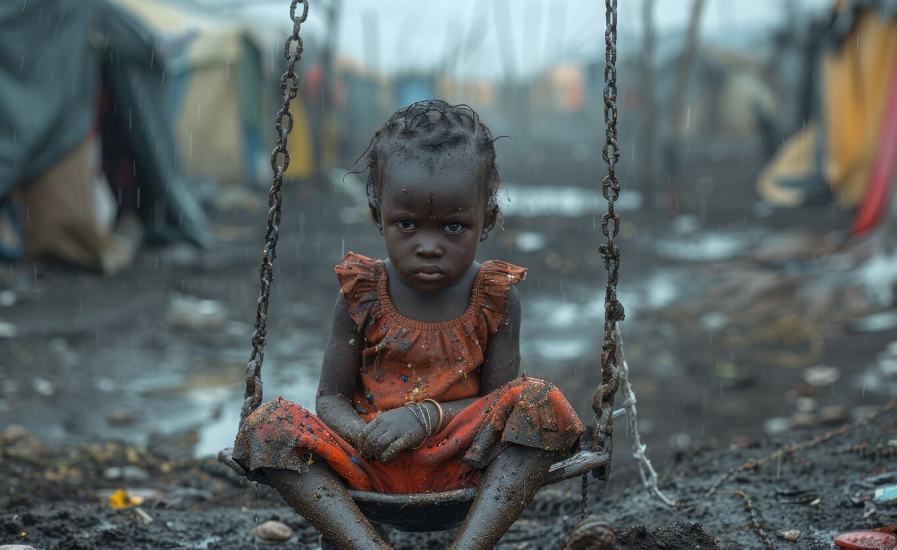More than 1.3 million vulnerable Nigerians could be left without lifesaving food support by August 2025, as the World Food Programme (WFP) warns it will run out of food supplies in Nigeria this month due to critical funding shortfalls. The alarming development threatens to deepen the humanitarian crisis in regions already ravaged by conflict, climate shocks, and economic hardship.
The WFP, a branch of the United Nations and one of Nigeria’s largest emergency food providers, confirmed that unless urgent donor support is mobilized, its operations will grind to a halt, leaving millions at risk of starvation and malnutrition, particularly in northeastern Nigeria, where hunger levels are already at emergency thresholds.
Perfect Storm of Crises: Conflict, Climate, and Cuts
The WFP cited three major drivers behind the crisis:
-
Ongoing insecurity and insurgent attacks in Borno, Yobe, and Adamawa States have displaced hundreds of thousands, destroying farms, disrupting trade routes, and making self-sufficiency impossible.
-
Climate change continues to devastate rural livelihoods through prolonged droughts, floods, and erratic rainfall patterns, especially in the North-East and Middle Belt.
-
Termination of key aid contracts, including those from USAID and other international donors, have significantly reduced the operational capacity of humanitarian agencies on the ground. USAID reportedly scaled back support amid broader global aid reallocation and budget constraints.
“Without additional funding, we will be forced to make painful choices about who eats and who doesn’t,” said Cyndy McCain, WFP’s Executive Director. “This is not just a number—it’s over a million lives hanging in the balance.”
Immediate Impact: Hunger Looms for Families and Children
The expected cuts will primarily affect:
-
Internally displaced persons (IDPs) living in camps and host communities
-
Children under five, who face life-threatening malnutrition
-
Pregnant and lactating mothers, already dealing with extreme poverty
-
Smallholder farmers affected by climate-induced crop failures
Reports from field workers in Borno State indicate that many families now survive on one meal per day, often made from scavenged or non-nutritious food. Malnutrition-related illnesses are also on the rise, putting additional pressure on fragile local health systems.
National Implications: Food Crisis Worsening
The warning from WFP comes as Nigeria continues to grapple with a wider food security crisis, exacerbated by:
-
Rising inflation and food prices (food inflation stood at 40.5% in April 2025)
-
Disruptions in agricultural supply chains
-
Fuel subsidy removals, which have raised transportation and logistics costs
The National Bureau of Statistics (NBS) estimates that over 26 million Nigerians are currently food insecure, with the worst conditions reported in the North-East and North-West regions.
Experts warn that if international aid continues to decline, Nigeria may face a famine-like scenario in conflict-affected regions before the end of the year.
Calls for Urgent Action
Humanitarian organizations, including the Nigerian Red Cross and Médecins Sans Frontières (Doctors Without Borders), have joined the WFP in urging:
-
Immediate release of emergency funds by donor nations and global agencies
-
Greater support for local agricultural recovery and resilience programs
-
Strengthened partnerships between the Nigerian government and international stakeholders to scale humanitarian assistance
The Federal Ministry of Humanitarian Affairs, in a press briefing, acknowledged the looming crisis and called for collaborative intervention but has yet to announce a detailed response plan.
Conclusion: A Preventable Tragedy?
The looming cut to WFP food aid underscores the fragility of humanitarian safety nets in Nigeria. As the country contends with climate vulnerability, security threats, and economic strain, millions remain heavily reliant on international assistance for survival.
This is a make-or-break moment for Nigeria’s humanitarian strategy. Without swift, coordinated action, the hunger crisis may spiral into mass displacement, increased mortality, and long-term instability.
The world must not look away. Over one million lives are at risk, and the countdown has already begun.
Published on Xamblog.com – Reporting the untold stories shaping Nigeria’s humanitarian, economic, and development landscape.
Last Updated on July 7, 2025 by kingstar





